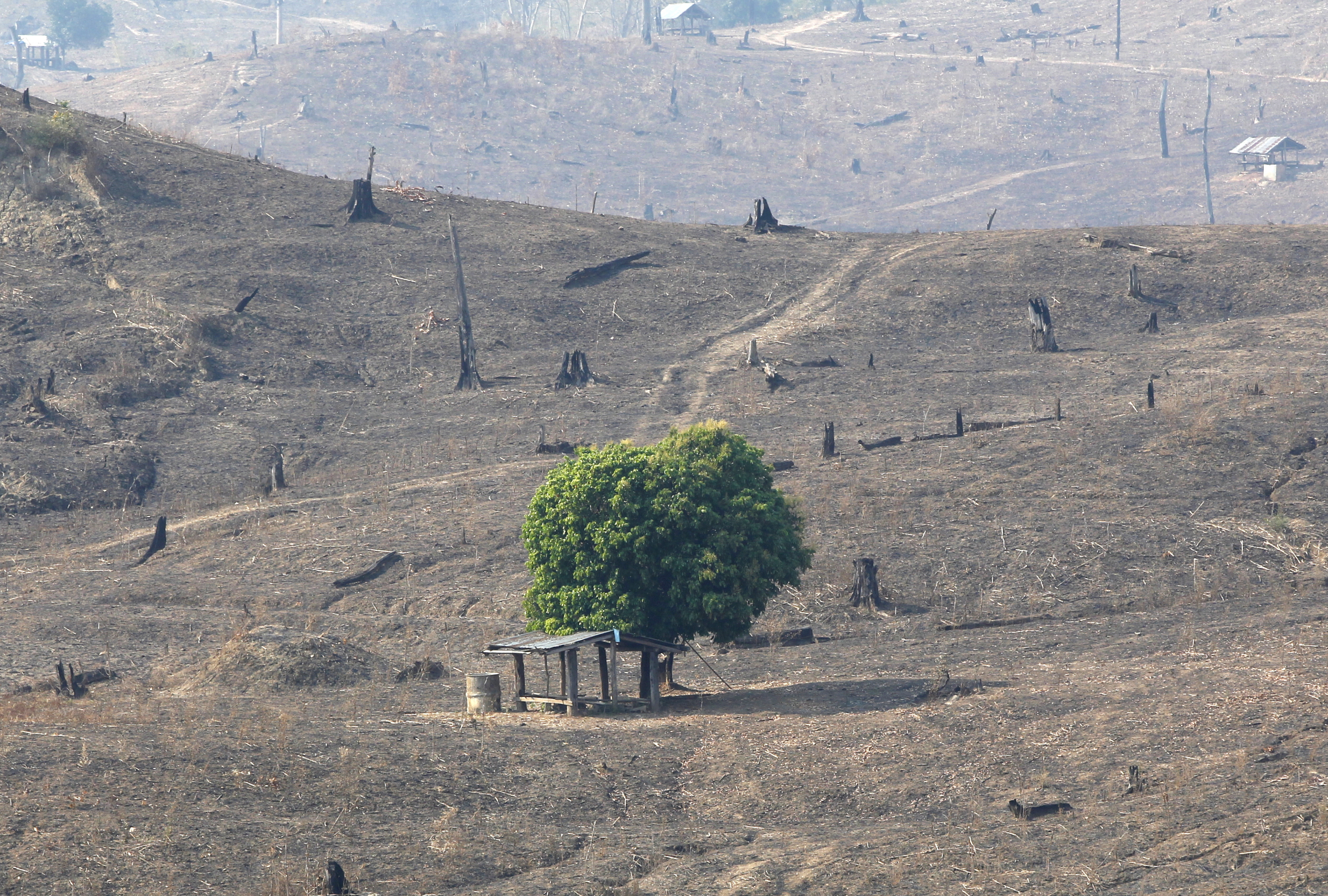Share post now

global
The Alliance Sud magazine analyses and comments on Switzerland's foreign and development policies. "global" is published four times a year (in german and french) and can be subscribed to free of charge.
EU deforestation regulation
21.06.2024, Trade and investments
A new regulation prohibits the import into the EU of the seven products most linked to deforestation. There must be no harm to small producers in the South.

A single green tree in the burnt and deforested landscape near Mae Chaem, northern Thailand.
© Keystone / EPA / Barbara Walton
The new European Union Deforestation Regulation (EUDR) will take full effect on 1 January 2025. Imports into the European Union (EU) of the seven commodities that contribute most to the death of forests – cocoa, coffee, palm oil, rubber, soya, wood, cattle – and their derived products such as chocolate, coffee capsules, furniture, paper, tyres, for example, will only be allowed if it is demonstrated that they originate from land that was not deforested after 1 January 2020. They must also respect labour rights, anti-corruption standards and the rights of indigenous peoples, among other things.
For those purposes, producing countries will be divided into three categories based on the risk of deforestation, and production sites will be monitored by sophisticated technology, including geo-tracking. The initiative forms part of the EU Green Deal, which is based on an incontrovertible finding: after China, the Twenty-seven are the main importers of products that contribute to the deforestation linked to international trade. Due diligence, i. e., ensuring the absence of deforestation, must be carried out by all players in the supply chain – producers, exporters and importers large and small, with more or less stringent conditionalities, depending on size.
The NGO Fern (Forests and the European Union Resource Network) takes the view that the regulation could also affect Honduras, Ghana and Cameroon, which are countries especially dependent on exports to the EU.
The countries of the Global South are steadfastly opposed to this initiative, which they view as disguised protectionism and a new green colonialism. In September 2023, 17 Heads of Government of Latin America, Africa and Asia sent a letter to the Presidents of the European Commission, European Parliament and Council of Ministers deploring the "one-size-fits-all" approach of the EUDR and the fact that it ignores the different local conditions.
Smallholders and small-scale producers, in particular, will find it extremely difficult to prove their compliance with the requirements, even though, except for a few products like coffee and cocoa, it is mainly the large producers and exporters who are able to place their products on European markets.
The negative impacts of this initiative were not long in coming. As highlighted by the International Institute for Environment and Development, European importers are already turning away from Ethiopian coffee and instead towards Brazilian coffee, which is much more traceable.
In its Trade and Development Report 2023, UN Trade and Development (formerly UNCTAD) expressed concern over the proliferation of unilateral initiatives like the EUDR and the Carbon Border Adjustment Mechanism (CBAM) – the carbon tax at the border also imposed by the EU on highly polluting products such as aluminium. They are seen as violating the principle of common but differentiated responsibilities enshrined in the Paris Climate Agreement.
Krungsri Research View looked specifically at the case of Thailand, which demonstrates the ambivalent nature of the impact of the EUDR. The products covered by the EUDR represent a mere 8.3 per cent of exports to the EU and 0.7 per cent of all Thai exports, but their value is rising.
Producers and exporters of rubber, wood and palm oil will have to bear substantial costs in adapting to the new regulation; small producers will lose their competitiveness and Thailand risks finding itself excluded from world supply chains.
But if the process is adequately supported, both by the government and through the aid available under the EUDR, Thailand could gain a competitive advantage over its competitors while conserving its forests.
And what about Switzerland? The country is being indirectly affected by the new provision, as all exports of the seven products to the EU must meet EUDR requirements. Krungsri also states that our country even ranks 17th in terms of impact, with regard to cocoa and especially coffee.
So far, the Swiss government has decided not to adapt Swiss law to the EUDR for as long as mutual recognition with the EU is not possible. This is meant to avoid doubling the administrative burden on Swiss companies. But it plans to conduct an impact study by the summer and to take a decision thereafter.
Civil society is examining the matter. Alliance Sud participates in a working group that is studying whether and how to adapt the EUDR to Switzerland. The concern is to avoid penalising small producers in countries of the Global South. Where necessary, support and training measures should be put in place, and local communities consulted. This would ensure that the fight against climate change does not prejudice the potential for further developing international trade.
Share post now

global
The Alliance Sud magazine analyses and comments on Switzerland's foreign and development policies. "global" is published four times a year (in german and french) and can be subscribed to free of charge.